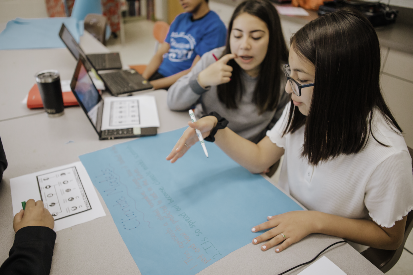NGSS
Disciplinary Core Ideas
- HS-ESS2.A3:THe geological record shows that the changes to global and regional climate can be caused by interactions among changes in the sun's energy output or Earth's orbit, tectonic events, ocean circulation, volcanic activity, glaciers, vegetation, and human activities. These changes can occur on a variety of time scales from sudden (e.g. volcanic ash clouds) to intermediate (ice ages) to very long-term tectonic cycles.
- HS-ESS2.D1: The foundation for Earth’s global climate systems is the electromagnetic radiation from the sun, as well as its reflection, absorption, storage, and redistribution among the atmosphere, ocean, and land systems, and this energy’s re-radiation into space.
- HS-ESS2.D2: Gradual atmospheric changes were due to plants and other organisms that captured carbon dioxide and released oxygen.
- HS-ESS2.D3: Changes in the atmosphere due to human activity have increased carbon dioxide concentrations and thus affect climate.
- HS-ESS2.D4: Current models predict that, although future regional climate changes will be complex and varied, average global temperatures will continue to rise. The outcomes predicted by global climate models strongly depend on the amounts of human-generated greenhouse gases added to the atmosphere each year and by the ways in which these gases are absorbed by the ocean and biosphere.
- HS-ESS3.D1: Though the magnitudes of human impacts are greater than they have ever been, so too are human abilities to model, predict, and manage current and future impacts.
- HS-ESS3.D2: Through computer simulations and other studies, important discoveries are still made about how the ocean, the atmosphere, and the biosphere interact and are modified in response to human activities.
Performance Expectations
- HS-ESS2-4: Use a model to describe how variations in the flow of energy into and out of Earth’s systems result in changes in climate.
- HS-ESS3-5: Analyze geoscience data and the results from global climate models to make an evidence-based forecast of the current rate of global or regional climate change and associated future impacts to Earth systems
- HS-ESS3-6: Use a computational representation to illustrate the relationships among Earth systems and how they are being modified due to human activity.
Other Relevant NGSS References:
- NGSS Appendix F (pdf): Science and Engineering Practices in the NGSS
- NGSS Appendix G (pdf): Crosscutting Concepts
- NGSS Appendix H (pdf): Understanding the Scientific Enterprise: The Nature of Science in the Next Generation Science Standards
- NGSS Appendix J (pdf): Science, Technology, Society and the Environment
This is a beta version of Lesson Set One.

